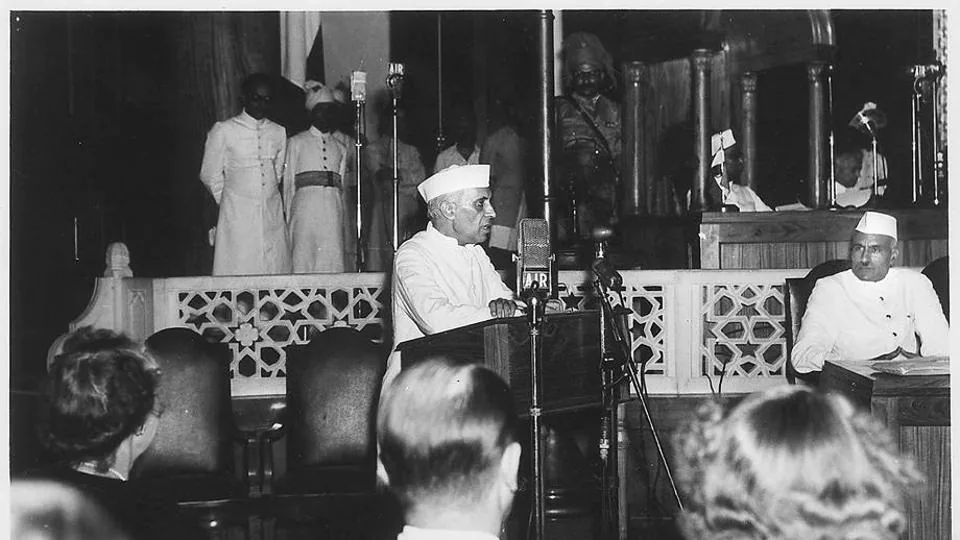
Jawaharlal Nehru, the first Prime Minister of India, delivering his Tryst with Destiny speech on the eve of independence. It is considered to be one of the greatest speeches of the 20th century.
Pt. Jawaharlal Nehru is remembered as an author, humanist, and a charismatic central figure of the Indian freedom struggle. His conscious efforts in promoting values such as secularism and universal brotherhood during his tenure as the first Prime Minister of independent India made him a true democrat. Let us go back to his iconic first official address titled, “Tryst with destiny.”
Pt. Jawaharlal Nehru delivered his speech titled Tryst with Destiny on the eve of india’s independence on August 14, 1947, from the ramparts of the historical Red Fort in Delhi to the Indian Constituent Assembly in the Parliament. The address was simultaneously broadcast on the radio to the millions of citizens who had toiled and waited for the dawn of freedom.
Nehruvian thought
Nehnu was the embodiment of the vision our nationalist leaders had of independent India. Neither on the political stage nor on moral stature was his leadership ever challenged. He was one of the great leaders of the national movement who not only campaigned for the country’s freedom but also ushered it into modernity. Historians recall that there were four focal foundational principles that attributed to this shared vision of post-colonial India according to the spectrum of people who participated in the freedom struggle. These principles were iterated by the first Prime Minister of the nascent nation in his August 14 address.
Sovereignty at the stroke of midnight
Giving a vocal expression to the longing and the self-determination of the Indian people, Nehru declared Long years ago we made a tryst with destiny, and now the time comes when we shall redeem our pledge… At the stroke of the midnight hour, when the world sleeps, india will awake to life and freedom Freedom and power bring responsibility. The responsibility rests upon this Assembly, a sovereign body representing the sovereign people of India (excerpt from Tryst with Destiny)
A democratic nation
The Gandhian philosophy of Sarvodaya or universal upliftment was one of the non-negotiable tenets of the freedom movement. In his first address as the appointed leader of India. Nehru paid homage to Gandhiji by saying. On this day our first thoughts go to the architect of this freedom, the Father of our Nation who held aloft the torch of freedom and lighted up the darkness that surrounded us generations will remember this message and bear the imprint in their hearts of this great son of India magnificent in his faith and strength and courage and humility (excerpt from Tryst with Destiny)
Celebration of diversity
-All of us, to whatever religion we may belong, are equally the children of India with equal rights, privileges and obligations. We cannot encourage communalism or narrow-mindedness, for no nation can be great whose people are narrow in thought or in action. “(excerpt from Tryst with Destiny)
Nehru believed that in a country like India which is home to people with different faiths and religions, no real nationalism can be built except on the basis of secularity.
A pro-poor orientation
From the early nationalist days, the poor were at the centre of imagination when one thought of a liberated India Dadabhai Naoroji in his book Poverty and Un-British Rule in India elaborates on how colonialism relied on corruption and wealth inequality to sustain itself. He exclaimed that a devastated economy inhibits political independence. Therefore, aligning with the common consensus, eradication of poverty was seen as a fundamental move to exercise literal autonomy as India stood on the cusp of freedom
These sentiments echoed in Nehru’s statement. “The service of India means. the service of the millions who suffer. It means the ending of poverty and ignorance and poverty and disease and inequality of opportunity. To bring freedom and opportunity to the common man, to the peasants and workers of India: to build up a prosperous, democratic and progressive nation, and to create social, economic and political institutions which will ensure justice and fullness of life to every man and woman. There is no resting for any one of us till we make all the people of India what destiny intended them to be” (excerpt from Tryst with Destiny)
Nehru came into power when the flames of violence were burning across the country following the tragedy of partition. But even in these unsettling circumstances, his insistence on retaining democracy and the idea that in a country no leader should be bigger than its people. Constitution and State is what makes him one of the most celebrated leaders of the 20th Century.
DID YOU KNOW?
1. Before immersing himself in India’s freedom struggle, Nehru was training to be an advocate.
2. In 1937 Nehru anonymously published an article in the Modem Review journal of Calcutta under the pen name Chanakya criticising himself as “some triumphant Caesar passing by, who might tum into a dictator with “a little twist. He did this to encourage the people of the nation to hold their leaders accountable.
3. Nehru’s close associates say that in his last moments, a note with the following lines from Robert Forst’s poem Stopping by Woods on a Snowy Evening lay on his side.
“The woods are lovely dark and deep,
But I have promises to keep,
And miles to go before I sleep,
And miles to before I sleep.”
Picture Credit : Google




